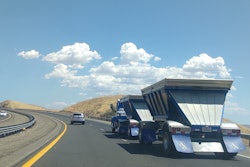After a bill that proposed to criminalize non-citizen drivers, nondomiciled CDL holders and commercial motor vehicle drivers who don't speak English got introduced into the Arkansas state legislature, another similar bill has popped up and sparked protest from a group called American Truckers.
American Truckers, co-founded by former fleet owner Shannon Everett, backed HB 1569, the "Secure Roads and Safe Trucking Act of 2025," that would ban out-of-state nondomiciled CDL and commercial learners permit holders from operating commercial vehicles in the state and seek to impound their trucks and fine them $5,000 per violation.
Nondomiciled CDLs are CDLs issued by states to non-residents. The Owner-Operator Independent Drivers Association's Director of State Affairs Doug Morris said that, in the past, states might issue a nondomiciled CDL to, for example, someone who lived in southern Utah and closer to a CDL training facility in Arizona than one in their home state.
Now, "anybody from any country can get a CDL in the U.S. if they come here," said Morris. "Each state is different" in what criteria they use for issuing CDLs, he said. Illinois, for example, requires only an "Employment Authorization Document" (EAD) for non-domiciled residents to obtain a commercial learners permit.

Morris said that 2019 guidance from the Federal Motor Carrier Safety Administration simplified and changed some definitions around CDL regulations, specifically clearing up language around who can get a non-domiciled CDL and "kind of opened the door up for anybody from any country" to work as a CDL driver in the U.S.
Reached for comment, neither representatives from FMCSA nor the Commercial Vehicle Safety Alliance could answer the question of how many non-domiciled CDLs had been issued in the last few years, but it's clear based on moves being made in Arkansas scrutiny of the issue from all angles is gaining steam among lawmakers there.
According to Shannon Everett and the American Truckers associates who protested at the Arkansas State House last week, it's become a safety issue. As reported previously, Everett sees evidence of deteriorating safety in a fatal 2024 crash in Colorado, among others, where the at-fault truck driver had been deported numerous times.
 The American Truckers group is shown here protesting the Arkansas Trucking Association-backed bill as attention to non-citizen drivers in the state heated up.American Truckers
The American Truckers group is shown here protesting the Arkansas Trucking Association-backed bill as attention to non-citizen drivers in the state heated up.American Truckers
[Related: State bill would criminalize non-citizen truck drivers]
The Arkansas Trucking Association opposed Everett and company's favored bill and put their backing behind another, HB 1745, "an act to require certain commercial driver license holders to possess a U.S. work authorization to operate a commercial motor vehicle in the state; to create the offense of presenting a false foreign CDL; and for other purposes."
The association-backed bill proposes more limited action, but still seeks to impose penalties on drivers without complete documentation. If a driver holds a foreign CDL and does not "have an Employment Authorization Document in his or her immediate possession while operating a commercial motor vehicle," that driver could be guilty of a felony, or a misdemeanor in some cases if they have other evidence of an EAD but not the EAD itself, according to the bill.
It also imposes criminal charges for faked foreign CDLs. In the Arkansas Trucking Association's December 2023 edition of its bi-monthly report, the association wrote about the issue of fake foreign CDLs, which the 1745 bill addresses and the 1569 bill does not. The association's article describes a "crackdown by the state of Texas on foreign drivers using fraudulent Mexican commercial driver’s licenses," which it said had begun to spread to other states, including Arkansas. The article cites Texas' 2023 HB 4337 as a legal framework to move against such false foreign CDLs, sometimes acquired at flea markets in Mexico, according to the article.
An Arkansas Trucking Association representative called 1745 an "innocuous piece of legislation intended to be a tool for law enforcement to get fake CDLs off the road."
Everett and the American Truckers group support those two provisions, yet ultimately protested against the legislation.
Everett takes issue with language in the association-backed bill that says drivers must have a "Commercial driver license issued by Canada, Mexico, or any other jurisdiction under a waiver or exemption recognized by the Federal Motor Carrier Safety Administration" as well as an EAD. That clause, Everett said, would "legalize foreign commercial drivers licenses for operation in the state of Arkansas."
It's "not necessary to amend the reciprocity section of the state law to include other foreign countries," to accomplish the purpose of criminalizing fake foreign CDLs, he said.
The Arkansas Trucking Association rep countered that if the state wanted to add an option for criminal penalties for certain drivers, it needed to define who gets the criminal penalties and under what circumstances.
Everett's preferred bill, 1569, sought to end recognition of Canadian and any other foreign CDLs in Arkansas, problematic for currently legal Mexico- and Canada-domiciled truckers hauling cross-border freight to or through the state, but that eventually got amended to include Mexican and Canadian CDLs as legal. Everett's group shared the graphic at this link illustrating their view of the two bills' different approaches. Ultimately, OOIDA said it held a measure of support for both bills, and all sides agreed further action beyond the two bills would be needed to address underlying issues.
The new bill backed by the Arkansas Trucking Association addresses reciprocity with Canada with a clause that states a person may drive a commercial vehicle in the state if they have a commercial "driver license issued by Canada, Mexico, or any other jurisdiction under a waiver or exemption recognized by the Federal Motor Carrier Safety Administration" and a valid EAD.
OOIDA's Morris said his organization basically supported both bills, but found Everett's efforts unlikely to pass legal muster.
"We were generally supportive of both bills but 1569 probably would be held up in court, or probably some of the attorneys general from most states would have fought it," said Morris. Canada, for example, might file a lawsuit. "Trucking companies might file lawsuits because of contracts they have, and there are stipulations against this in U.S.-Mexico trade agreements."
Indeed if Arkansas ended reciprocity with other parties in the Commercial Vehicle Safety Alliance, it could lose out on federal aid highway funds as well as Motor Carrier Safety Assistance Program grants.
But OOIDA and the American Truckers group do agree on bringing back out-of-service violations for drivers without English language proficiency, something CVSA did away with in 2016, followed shortly by FMCSA relaxing violation-issuing practices for the same with a 2016 memo.
"We’ve actually petitioned the CVSA to put English language proficiency back in OOS criteria," said Morris. "If a driver doesn’t understand road signs," it's a safety issue. "We would be in favor of reversing the 2016 policy guidance that made it not an OOS violation, period," said Morris.
In that way, OOIDA supports the Arkansas bill 1745 as a step in the right direction, but still seeks to address some of the problems raised by Everett's group in other venues.
“We generally support the intent of HB 1745 in the Arkansas legislature," said Morris, "but wish the bill went further to address the underlying issue," what he called "corporate megacarriers recruiting foreign truck drivers to undercut the ability of American truckers to earn a decent living." Such carriers, he said, "will use every loophole available, including those previously established by the FMCSA, to save a buck on the backs of American truckers. We are actively pursuing solutions on the state and federal level to right this wrong.”
Among those loopholes, according to Morris, is circumvention of "cabotage" prohibitions that limit Mexican and Canadian carriers and their drivers solely to pickup and delivery in or from the U.S. when the origin or destination of the freight is the home country. Too many, Morris said, will make a drop in the U.S. and then continue to illegally make point-to-point deliveries within the country. That is, to engage in illegal cabotage. "Our position is that the state and local law enforcement know about cabotage, but don’t have enforcement mechanisms" to police it, said Morris, citing what he'd heard from Customs and Border Protection officials.
[Related: Cabotage across the pond: How deregulatory moves in the EU sparked backlash]
A CVSA representative noted the fragmented nature of enforcement of these laws, but contested that Mexico-domiciled carriers and drivers engaged in cabotage can be dealt with.
"Cabotage for Canadian motor carriers is only enforceable by immigration officials," the rep said, citing Department of Homeland Security regulations 19 CFR 123.14 and 8 CFR 214.2. "There is nothing in the transportation regulations that deal with that for Canada." For Mexico-domciled carriers, on the other hand, transport regulations that were "part of the trade agreement between Mexico and the U.S.," the rep said, effectively "deal with it." CVSA cited, in particular,49 CFR 365.501(b).









